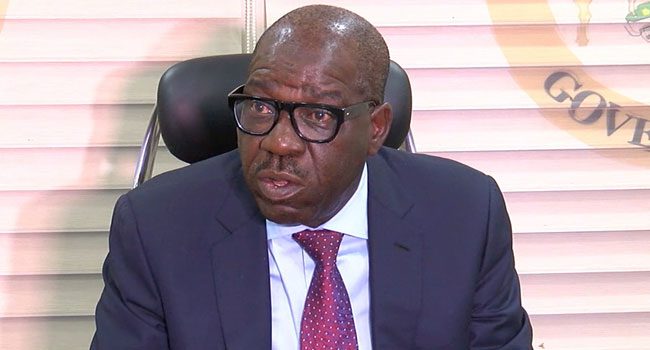Politics
REMINDER: Should I Become a Godfather, Deal with Me,” Obaseki Challenges

In a bold declaration, Governor Godwin Obaseki of Edo State has thrown down the gauntlet, challenging anyone who might perceive him as a potential political godfather to confront him directly. This statement, made during a public address, underscores Obaseki’s commitment to transparency and his aversion to the entrenched system of political patronage that has long plagued Nigerian politics.
The term “godfather” in Nigerian politics typically refers to influential individuals who wield significant power and influence over political actors and processes. They often dictate the selection of candidates for political positions and exert control over elected officials, creating a system of patronage that can undermine democratic principles.
Obaseki’s defiance of this political archetype reflects his determination to break free from traditional power structures and prioritize the interests of the people. By openly challenging the notion of godfatherism, he is signaling his intention to govern independently and resist undue influence from behind-the-scenes power brokers.
In recent years, Nigerian politics has been characterized by intense power struggles between political godfathers and their proteges, leading to instability and disenchantment among the electorate. Obaseki’s stance represents a departure from this norm and offers hope for a more accountable and responsive form of governance.
The governor’s willingness to confront the issue head-on demonstrates his courage and determination to enact meaningful change. Rather than succumbing to pressure from vested interests, he is taking a principled stand against the corrosive influence of godfather politics.
Obaseki’s challenge also serves as a rallying cry for other political leaders and aspiring candidates who are committed to genuine reform. By refusing to bow to the whims of godfathers, he is setting a precedent for a new generation of politicians who prioritize integrity and service above personal gain.
However, Obaseki’s declaration is not without risk. Political godfathers wield considerable power and have been known to use their influence to undermine and intimidate those who oppose them. By openly defying this entrenched system, Obaseki may face backlash and resistance from entrenched interests.
Nevertheless, the governor’s boldness has earned him widespread admiration and support from ordinary Nigerians who are tired of the status quo. His willingness to take on the establishment and champion the cause of good governance has bolstered his reputation as a reform-minded leader.
Moving forward, Obaseki’s challenge to potential godfathers will likely reverberate throughout Nigerian politics, sparking a broader conversation about the need for greater accountability and transparency in governance. As more leaders follow his example and reject the politics of patronage, the country may inch closer to realizing its democratic ideals.
Governor Godwin Obaseki’s defiant challenge to potential political godfathers represents a significant moment in Nigerian politics. His willingness to confront entrenched power structures and prioritize the interests of the people signals a new era of leadership characterized by integrity and accountability. While the road ahead may be fraught with challenges, Obaseki’s bold stance offers hope for a brighter and more democratic future for Nigeria.
